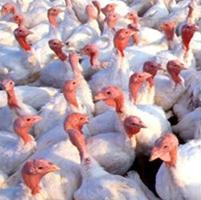Study: Turkeys thrive better on pelleted feed

Turkeys seem to benefit more than most species by switching to pelleted feeds with trial results showing that body weights at 20 weeks can be improved by up to 5% simply by using pellets.
In most animal species the use of pelleted feed ensures uniformity of nutrient supply and reduced wastage during transport and feeding, says natural feed additives company Kiotechagil.
“Pelleted feeds provide an easy-to-ingest, concentrated nutrient source that have been through a heating cycle and will therefore have a significantly reduced bacterial count,” says Kiotechagil’s chief technical officer Murray Hyden. “The heat of processing also assists with digestibility by pre-gelatinising starches and activating in-feed enzymes.”
Pellet quality is, however, subject to many factors, including ration formulation, grist size and stream quality. Additionally, it is extremely difficult to optimise all these points, and therefore there is a strong recommendation for feedmillers to use a top quality pellet binder. Many pellet binders require high volume additions and lead to nutrient dilution of the feed resulting in the need to reformulate with more expensive nutrients, low inclusion binders are therefore seen to be preferable.
Mastercube from Kiotechagil is a low inclusion binder that provides an immediate binding of the nutrients to give excellent pellet durability during pressing and cooling operations, says the company. This improved durability reduces returns and saves energy. This binder even acts as a lubricant in the die increasing mill throughput and reducing wear and tear. And, as it also contains a pellet hardener, the pellets do not get crushed during transport and feeding operations, but whilst providing additional calcium to the diet formulation.
Related link:












